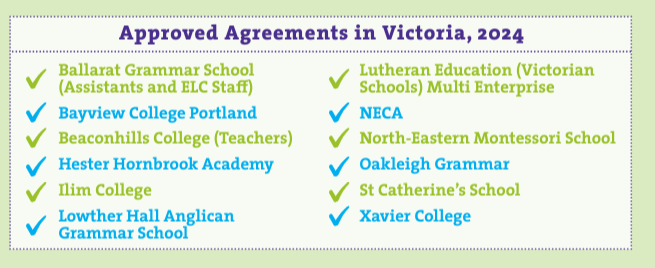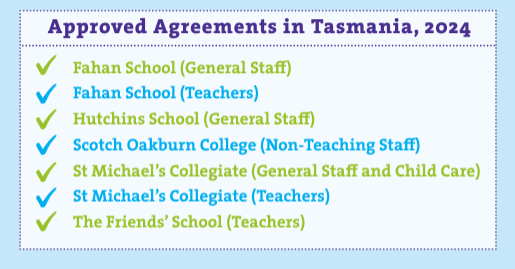The IEU says it’s a new era for deal-making in independent schools
In 2024, we’ve seen significant changes in independent school bargaining.
The union has achieved improvements for members through Agreement negotiations, Memorandums of Understanding, and school policy changes. At the same time, more teachers and education support staff in independent schools are challenging outdated practices and demanding fairer working conditions.
In these negotiations there has been a dual focus: securing fair wage outcomes that reflect the professional value of staff and addressing unsustainable workloads. The outcome of Victorian Government Sector Agreement negotiations are crucial for IEU members in independent schools, who are focused on securing wage increases that reflect their contribution to the school community and remain competitive with the government sector.
This has led to firm positions on wage increases at the bargaining table. Agreements signed in 2024 show that independent school staff are no longer accepting modest offers that don’t keep up with inflation or industry trends. The demand for competitive pay is also setting a clear direction for future negotiations.
Beyond salary, the most significant claims have been over workload reductions. Staff have expressed frustration with ever-increasing workloads, which are often compounded by co-curricular and extra-curricular responsibilities, and the proliferation of new duties and administrative tasks.
The expectation that teachers and education support staff must work outside of their scheduled hours, often without proper recognition or compensation, has led to burnout and declining morale. In response, the IEU has made securing workload reduction measures a priority. These efforts have seen varying levels of success, with some schools embedding workload provisions into legally enforceable Agreements, while others have resisted, insisting that these provisions remain in policy documents.
The difference is critical: while policies can be changed at a whim, clauses in an Agreement are binding and enforceable, offering staff much-needed protection. At Xavier College, for instance, the strength and unity of the school’s subbranch drove significant changes.
Through coordinated efforts, members pushed management to address workload issues, achieving tangible improvements that directly impact their work-life balance. This highlights a broader trend across the sector: where sub-branches have built their capacity they have successfully negotiated meaningful workload reductions.
While media attention tends to focus on teachers, 2024 has also seen significant progress for education support staff. These professionals, who play a critical role in the functioning of schools, have suffered from outdated classification structures that often fail to recognise their skills, experience and contributions.
The IEU has advocated tirelessly for fair and accurate classification models that allow education support staff to advance based on their experience and qualifications, thereby creating opportunities for these workers to be better recognised and rewarded.
Ensuring clear pathways for career progression will improve job satisfaction and help retain talent within the sector. One of the most significant changes this year has been the shift in staff attitudes towards bargaining. Independent school staff have often felt pressured to accept what was offered by their employers, even when it didn’t fully meet their needs. In 2024, this dynamic has shifted – the growing strength of sub-branches and an increased willingness to take action has given IEU members more leverage at the bargaining table than ever before.
We are now seeing more staff voting against Agreements that have not been endorsed by the IEU and don’t deliver fundamental changes, particularly around workload and co-curricular responsibilities. This newfound strength has translated into real action, with applications for Protected Action Ballots and, when necessary, industrial action.
Staff are no longer willing to accept employers’ assertions that change is impossible. For example, the long-held belief that scheduled class time reductions must come at the expense of salary increases is being challenged.
Similarly, the argument that reducing or removing extras would make schools unmanageable has been met with increasing scepticism.
The legislative landscape has also shaped independent school bargaining in 2024. Recent changes to the Fair Work Act and Awards have empowered employees, particularly provisions around Delegate Rights and the Right to Disconnect.
These changes offer new opportunities for staff to negotiate better terms, particularly in the areas of workload and work-life balance. The IEU has made the most of these changes, drafting model clauses that are tabled for inclusion in Agreements. These clauses go beyond the basic provisions of the Educational Services Teachers or General Staff Awards, offering better protections and more favourable conditions.
Many employers have been hesitant to adopt these clauses. Despite this resistance, the union’s strategy has been to present these model clauses not as demands but as investments in the future success of the school.
By framing the conversation around the benefits of a happy, healthy, and motivated workforce, the IEU has made significant inroads with some previously reluctant employers, laying the groundwork for further improvements in future Agreements.
The lessons of 2024 will be critical in shaping future bargaining strategies. Independent school staff have shown they are no longer content to accept the status quo. They are demanding more recognition, more fairness, and a better work-life balance.
This year has shown that when members stand together, they can achieve outcomes that were once thought unattainable.
To build on this momentum, we must continue to empower sub-branches, build solidarity, and use data and lived experiences to make compelling cases at the bargaining table.
This gives us real potential to achieve even greater outcomes in coming years. This has been a year of significant change and progress in independent school bargaining.
Staff have found their voice, and employers are increasingly recognising in a time of staff shortages that fair wages, reasonable workloads, and professional recognition are essential components of a thriving educational community.
Together, we have set a strong foundation for future success, and with continued unity and determination, there is no limit to what we can achieve in 2025 and beyond.



